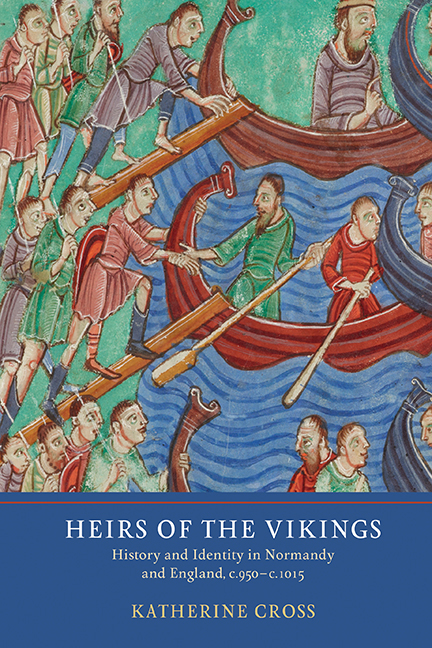Book contents
- Frontmatter
- Dedication
- Contents
- List of illustrations
- Acknowledgements
- Abbreviations
- Note on terminology
- Map
- Introduction: The Problem of Viking Identity
- 1 Genealogy: Building a Viking Age Dynasty
- 2 Origin Myths: A People for a Dynasty
- 3 Hagiography I: Ruin and Restoration
- 4 Hagiography II: Saintly Patronage
- 5 Charter Narratives: Normans, Northumbrians and Northmen
- Conclusion: Viking Age Narratives and Ethnic Identities
- Appendix 1 The Date of Fulbert's Vita Romani
- Appendix 2 The Dates of the Latin Vita Prima Sancti Neoti and the Old English Life of St Neot
- Bibliography
- Index
2 - Origin Myths: A People for a Dynasty
Published online by Cambridge University Press: 19 July 2019
- Frontmatter
- Dedication
- Contents
- List of illustrations
- Acknowledgements
- Abbreviations
- Note on terminology
- Map
- Introduction: The Problem of Viking Identity
- 1 Genealogy: Building a Viking Age Dynasty
- 2 Origin Myths: A People for a Dynasty
- 3 Hagiography I: Ruin and Restoration
- 4 Hagiography II: Saintly Patronage
- 5 Charter Narratives: Normans, Northumbrians and Northmen
- Conclusion: Viking Age Narratives and Ethnic Identities
- Appendix 1 The Date of Fulbert's Vita Romani
- Appendix 2 The Dates of the Latin Vita Prima Sancti Neoti and the Old English Life of St Neot
- Bibliography
- Index
Summary
The genealogies examined in the previous chapter counted generations back to ‘founder ancestors’ of a dynasty or of an entire gens. Thus the Merovingian dynasty took their name from Merovech, while the West Saxons located their origins in the figure of Cerdic, the first of their people to arrive in Britain. Placed within genealogical lists, these names held meaning only because they were attached to a deeper store of historical narrative: origin myths, which recounted the actions of the founder ancestors. In the person of the founder ancestor, the boundaries between dynasty and people often seemed to dissolve. Like genealogies, these origin myths (usually called origines gentium by modern historians) echoed and referred to contemporary ethnic relations. An origin myth for a people that no longer existed would cease to be recounted, since the motive for recounting the narrative was to explain the existence of contemporary groups. Individuals within such histories were representative of group identities currently important in the perceptions of writers and audience.
Origin myths have been used to discuss the actual pasts of Germanic peoples during the ‘Age of Migrations’ but, given their fluid nature and the chronological distance at which they were usually written, they are extremely unreliable as evidence of the events they describe. The designation of ‘myth’ is perhaps a little misleading, since it implies a separate genre from other forms of history. In fact, we know of these origines gentium from their places in conventional histories such as Bede's Historia ecclesiastica and Jordanes's Getica, in which they are not treated differently from other historical events. Moreover, as we shall see in this chapter, writers continued to create such tales as ethnic relations developed. They are united more by function than literary genre.4 However, early medieval origin myths tended to employ a common vocabulary and increasingly referred to their earlier precursors. Susan Reynolds has emphasized that Scandinavian ancestry was as much a part of this vocabulary as descent from Troy or Noah's Ark. Scholars have treated accounts of Scandinavian origins as somehow more historical than other myths, but such origins were similarly a literary creation, and eventually became a topos, employed by early medieval writers in much the same way. These traditions then influenced perceptions of the Scandinavian origins of raiders and migrants in the Viking Age.
- Type
- Chapter
- Information
- Heirs of the VikingsHistory and Identity in Normandy and England, c.950–c.1015, pp. 61 - 84Publisher: Boydell & BrewerPrint publication year: 2018

